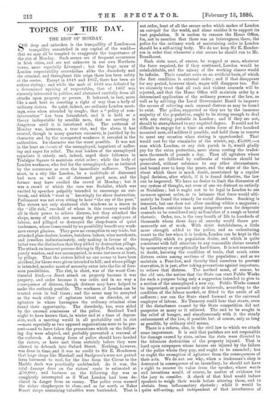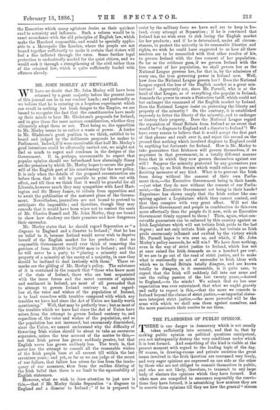TOPICS OF THE DAY.
THE RIOT OF MONDAY.
SO deep and unbroken is the tranquillity of London—a tranquillity unmatched in any capital of the world— that we may all be tempted to exaggerate the importance of the riot of Monday. Such scenes are of frequent occurrence in Irish cities, and are not unknown in our own Northern towns, more especially Liverpool ; but the huge mass of London respectability overwhelms alike the disorderly and the criminal, and throughout this reign there has been safety at the centre. Except in 1848 and 1867, there has been no serious rioting ; and while the mob of 1848 was defeated by a determined uprising of respectables, that of 1867 was sincerely interested in politics, and abstained carefully from all attacks upon property or person. It behaved, in fact, more like a mob bent on asserting a right of way than a body of ordinary rioters. So quiet, indeed, are ordinary London meet- ings, even when attended by roughs, that a " policy of non- intervention " has been formulated, and it is held as a theory indisputable by sensible men, that no meeting is dangerous until it is interfered with. The outbreak of Monday was, however, a true riot, and the alarm it has created, though in many quarters excessive, is justified by its character and by the unexpected weakness it revealed in the authorities. Its character was the worst possible. It was not in the least an entente of the unemployed, impatient of suffer- ing and eager for relief. The real leaders of the unemployed repudiate it utterly, and, indeed, urged their followers in Trafalgar Square to maintain strict order ; while the body of London workmen, who feel for the unemployed, are as irritated by the occurrence as even the immediate sufferers. There must, in a city like London, be a multitude of distressed bad men as well as of distressed good men, and the former may have swelled the crowd of Monday ; but it was a crowd of which the core was Socialist, which was excited by speeches palpably intended to encourage an out- break, and which " went in " knowingly for sheer destruction. Parliament was not even sitting to hear "the cry of the poor." The rioters not only shattered club windows as a lesson to the " idle rich," one-half of whom in this country would do all in their power to relieve distress, but they attacked the shops, many of which are among the greatest employers of labour, and pillaged or destroyed the shop-fronts of quiet tradesmen, whose losses could by no possibility benefit any work- men except glaziers. They gave no exemption to any trade, but attacked glass dealers, hosiers, butchers, bakers, wine merchants, and jewellers indiscriminately, only making in favour of the latter two the distinction that they added to destruction pillage. The attack on innocent persons driving in Hyde Park was, again, purely wanton, and was accompanied, in some instances at least, by pillage. That the rioters killed no one seems to have been accident, for blows were given intended to kill; and where pillage is intended, murder must of necessity enter into the list of fore- seen possibilities. The riot, in short, was of the worst Con- tinental kind,—a direct attack on property because it was property, and order because it was order, and in no way a consequence of distress, though distress may have helped to make the outbreak possible. The workmen of London can be trusted even in bad times ; and the scene may be accepted as the work either of agitators intent on disorder, or of agitators in whose harangues the ordinary criminal class found their opportunity. The disorderly, too, were aided by the unusual remissness of the police. Scotland Yard ought to have known that, in winter and at a time of depres- sion, such a meeting would in all probability end in riot
—more especially as two opposed organisations were to be pre- sent—and to have taken the precautions which on the follow- ing day were adopted, and probably prevented a renewal of the outbreak. A strong force of police should have headed the rioters, or have met them certainly before they were allowed to debouch into Oxford Street. Nothing, however, was done in time, and it was no credit to Sir E. Henderson that huge shops like Marshall and Snelgrove's were not gutted from basement to roof, for the line from the Circus to the Marble Arch was practically undefended. As it was, the total damage done on the rioters' route is estimated at £0,000; and business on the following day was as completely interrupted as if West London had been de- clared in danger from an enemy. The police even warned the richer shopkeepers to close, and as far north as Baker Street shops containing valuables were barricaded. That is not order, least of all the secure order which makes of London an entrepot for the world, and alone enables it to support its vast population. It is useless to censure the Home Office, for, not to mention that there was an interregnum there, the police for the ordinary work of maintaining order in London should be a self-acting body. We do not keep Sir E. Hender- son in order that whenever a riot occurs he should run to Mr. Broadhurst.
Such riots must, of course, be stopped at once, whatever the force required, for if they continued, London would be uninhabitable, and the misery of the working classes would be infinite. Their comfort rests on an artificial basis, of which the first condition is external order ; and if that disappears for any period, however short, wages will disappear too. But we sincerely trust that all rash and violent counsels will be rejected, and that the Home Office will maintain order by a determined application of the ordinary powers of the law, as well as by advising the Local Government Board to improve the means of relieving such unusual distress as may be found to exist. The police, supported as they are by the immense majority of the population, ought to be strong enough to deal with any rioting probable in London ; and if they are not, should be strengthened to any required degree. It could not be difficult to engage for a time an extra force of five hundred mounted men, old soldiers if possible, and hold them in reserve to meet any occasion when rioting is apprehended. That would cost for the remainder of the winter, say, £5,000,—a sum which London, or any rich parish in it, would gladly pay for the extra protection, mere alarm costing the trades- men thousands of pounds a day. Then all agitators whose speeches are followed by outbreaks of violence should be prosecuted, without reference to any other circumstance, and bound over to keep the peace, and the state of the law, about which there is much doubt, ascertained by a regular legal decision, after which, if it is found defective, the law can be improved. We have no desire to limit the discussion of any system of thought, not even of one we distrust so entirely as Socialism ; but it ought not to be legal in London to use menaces against order, or to intimate that force would ulti- mately be found the remedy for social disorders. Smoking is innocent, but one does not allow smoking within a magazine ; and London contains too many desperate men for desperate counsels to be considered only as flourishes of a rough or brutal rhetoric. Order, too, is the very breath of life to hundreds of thousands whom three days of anarchy would throw per- manently out of work. With strict watchfulness, a little more strength added to the police, and an unhesitating resort to the law when it is broken, London can be kept in the tranquillity which its population desire, and which is quite consistent with full attention to any reasonable claims created by momentary or exceptionally hard times. It is not reasonable to doubt, knowing the condition of trade, that much extra distress exists among sections of the population ; and as we maintain a Poor-law, and thereby bind ourselves to prevent starvation, it is just, after taking precautions against imposture, to relieve that distress. The method must, of course, be the old one, the notion that the State can start Public Works for such a purpose being only a suggestion intended to give to a section of the unemployed a new cry. Public Works cannot be improvised, or pursued only at intervals, according to the condition of the labour market, or fitted to the needs of all sufferers ; nor can the State stand forward as the universal employer of labour. No Treasury could bear that strain, even if the disturbance caused by the State competition did not pauperise as many as it relieved. The end to be sought is the relief of hunger, and simultaneously with it the steady enforcement of the law, if possible, but, of course, only as long as possible, by ordinary civil means.
There is a reform, also, in the civil law to which we attach some importance. It is said that parishes are not responsible for damage caused by riots, unless the riots were directed to the felonious destruction of the property injured. That is hard upon ratepayers whose houses are injured by the failure of the police whom they pay, and ought to be amended ; but so ought the exemption of agitators from the consequences of their acts. We do not see why, when a tradesman's shop is destroyed in consequence of an incendiary, he should not have a right to recover its value from the speaker, whose words and intentions would, of course, be matter of evidence for the jury to consider. A check of that kind would induce speakers to weigh their words before uttering them, and to abstain from inflammatory rhetoric ; while it would be quite self-acting, and independent of that interference of the Executive which many agitators desire as their quickest road to notoriety and influence. Such a reform would be in exact accordance with the old principles of English law, which make the Hundred responsible, and would be specially applic- able to a Metropolis like London, where the people are not bound together sufficiently to make it certain that rioters will feel a fine inflicted through the rates. Some further legal protection is undoubtedly needed for the quiet citizen, and we would seek it through a strengthening of the civil rather than of the criminal law, which is quite sufficiently loaded with offences already.



































 Previous page
Previous page